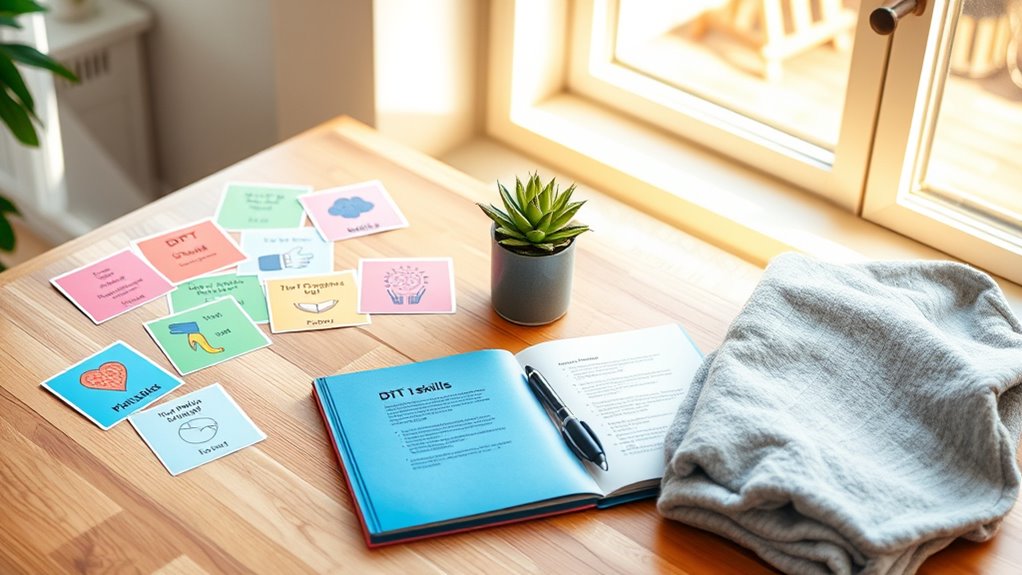You can start practicing DBT skills today to better manage intense emotions, curb impulsive reactions, and build healthier relationships. Focus on cultivating your Wise Mind by pausing to assess whether you’re acting from emotion or reason, and use mindfulness to stay present. Apply distress tolerance techniques like deep breathing or cold water exposure during tough moments. Recognizing and labeling your feelings further enhances emotion regulation. Keep exploring these tools to deepen your understanding and mastery of DBT skills.
Key Takeaways
- Practice mindfulness daily by focusing on your breath, sensations, or sounds to stay present and reduce stress.
- Use the Wise Mind technique to pause and evaluate whether your decision is driven by emotion or rational thought.
- Apply distress tolerance skills like deep breathing or cold water splashes during overwhelming moments to calm intense feelings.
- Keep a feelings diary to identify emotions, triggers, and develop personalized coping strategies.
- Incorporate soothing methods such as listening to calming sounds or using essential oils to manage emotional distress.

Have you ever wondered if you could begin improving your emotional well-being today? The good news is, you can start right now by learning some Dialectical Behavior Therapy (DBT) skills. These tools are designed to help you manage intense emotions, reduce impulsive behaviors, and build healthier relationships. You don’t need to wait for therapy appointments or long-term programs; many skills can be integrated into your daily routine immediately. The key is to be intentional and consistent in practicing them.
One of the most straightforward skills to try is the *wise mind* approach. When you’re overwhelmed by conflicting thoughts or feelings, pause and ask yourself whether you’re operating from your emotional mind or your rational mind. The goal is to find a balance—your *wise mind*—where you acknowledge your feelings without being ruled by them. To do this, take a moment to breathe deeply, focus on facts rather than judgments, and listen to your intuition. It helps you make clearer, more balanced decisions rather than reacting impulsively.
Pause, breathe, and find your *wise mind* to make balanced decisions amid conflicting feelings.
Another effective skill is *mindfulness*, which involves paying attention to the present moment without judgment. You can start practicing mindfulness today by simply taking a few minutes to focus on your breath, sensations in your body, or the sounds around you. When you notice your mind drifting to worries or past events, gently bring your attention back to the here and now. Mindfulness reduces stress, enhances emotional regulation, and improves your overall awareness of how you’re feeling and what you need. It’s a powerful way to stay grounded amid chaos.
*Distress tolerance* skills are also essential for times when emotions feel overwhelming. One simple technique is the *TIP* skill—Temperature, Intense exercise, Paced breathing, and Paired muscle relaxation. For example, you can splash cold water on your face to quickly calm a heated emotional state or take slow, deep breaths to soothe anxiety. These strategies don’t fix the problem but help you tolerate the distress without making things worse. They’re especially useful during crises or when you feel on the brink of impulsive actions.
Lastly, practicing *emotion regulation* involves recognizing and labeling your emotions, then working to change unhealthy responses. You might start by keeping a feelings diary, noting what you’re feeling and what triggers those feelings. From there, you can develop coping strategies, like engaging in activities that boost positive emotions or challenging unhelpful thoughts that intensify negative feelings. Additionally, understanding essential oils and their properties can be a soothing complement to your emotional regulation practices. This ongoing process helps you gain control over your emotional landscape, making it easier to navigate life’s ups and downs.
Frequently Asked Questions
Can DBT Skills Be Effective for Children or Teenagers?
Yes, DBT skills can be effective for children and teenagers. You can teach them emotional regulation, mindfulness, and interpersonal skills tailored to their developmental level. These techniques help young people manage intense emotions, reduce impulsive behaviors, and improve communication. With appropriate guidance and support, you’ll find that teens especially benefit from these skills, leading to better mental health, stronger relationships, and increased resilience as they navigate growing challenges.
How Long Does It Take to See Results With DBT Skills?
You might start noticing changes in a few weeks, but it varies based on your commitment and the issues you’re addressing. Consistently practicing DBT skills daily helps reinforce progress. Some people see improvements in emotional regulation and relationships within a month, while others may take longer. Patience and persistence are key. Keep practicing, and over time, you’ll likely find these skills becoming more natural and effective in managing your emotions.
Are DBT Skills Suitable for Managing Anxiety or Only for Emotional Regulation?
Did you know that 70% of people report improved emotional control with DBT skills? Yes, these skills are great for managing anxiety, not just emotional regulation. They teach you mindfulness, distress tolerance, and emotional regulation techniques that help you stay calm and focused. Whether you’re dealing with anxiety or intense emotions, DBT skills can help you respond more effectively, reducing feelings of overwhelm and increasing your resilience.
Can I Learn DBT Skills Without a Therapist?
Yes, you can learn DBT skills without a therapist by using books, online resources, and apps designed to teach these techniques. However, practicing with a professional provides personalized guidance and support, making it easier to apply skills effectively. If you’re committed, self-study can be beneficial, but consider seeking therapy eventually to deepen your understanding and guarantee you’re using the skills correctly and safely.
How Do I Incorporate DBT Skills Into Daily Routines?
Did you know that consistent practice can improve emotional regulation by up to 30%? To incorporate DBT skills into your daily routine, start small. Use mindfulness during your morning coffee or practice deep breathing before stressful meetings. Keep a journal of your progress and reflect on how skills like distress tolerance or emotion regulation help you. Over time, these small habits will become natural parts of your day.
Conclusion
Start today and watch your life transform like a garden blooming with new growth. These DBT skills are your seeds—small actions that can lead to big changes. Remember, every step you take is a brushstroke on the canvas of your well-being. Don’t wait for perfect conditions; the time to nurture your mental health is now. With patience and practice, you’ll find your inner strength blossoming into a vibrant, resilient you.









